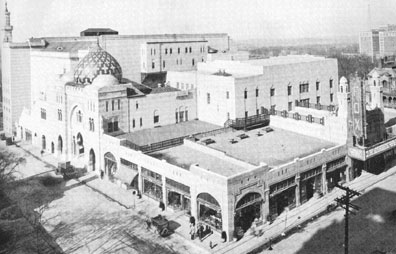

By Hal Doby
Originally written, March 1996, last revision: February 14, 2014
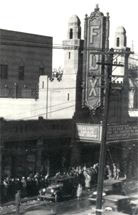 Yet despite the
financial horrors going
on, the Atlanta Fox Theatre opened to
much public jubilation on Christmas Day, 1929. Two days later,
the
Shriners held their first business meeting in their new Mosque. The
Mosque was formally dedicated on New Year's Day 1930 with a grand
Shrine ceremony held in the Grand Ballroom.
Yet despite the
financial horrors going
on, the Atlanta Fox Theatre opened to
much public jubilation on Christmas Day, 1929. Two days later,
the
Shriners held their first business meeting in their new Mosque. The
Mosque was formally dedicated on New Year's Day 1930 with a grand
Shrine ceremony held in the Grand Ballroom. 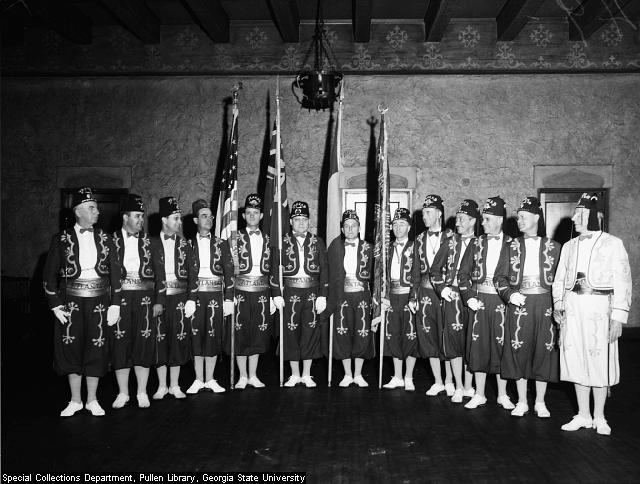 Early in the year, as a method to raise income for itself, the Oriental Band
Unit
of the Yaarab Temple subleased the Banquet Hall for $100 per
weekend for the remainder
of 1930, to stage weekend dances that became extremely popular. Their
weekly dances
made sufficient profit for the band unit to pay for the room rental
plus the unit's
traveling expenses to other Shrine functions.That brought in $5,000
worth of income for the Shrine in 1930. For the next six years, it made approximately $5,200 each year.
Early in the year, as a method to raise income for itself, the Oriental Band
Unit
of the Yaarab Temple subleased the Banquet Hall for $100 per
weekend for the remainder
of 1930, to stage weekend dances that became extremely popular. Their
weekly dances
made sufficient profit for the band unit to pay for the room rental
plus the unit's
traveling expenses to other Shrine functions.That brought in $5,000
worth of income for the Shrine in 1930. For the next six years, it made approximately $5,200 each year. As the Shriners had to do with the construction of their Mosque back in 1928, people were now forced to reduce their budgets to an absolute minimum with absolutely no non-essential items. One of the first perceived non-essentials was memberships in fraternal or social organizations. As the memberships declined, paying Temple bills went from being hard to nearly impossible. In January 1931, only one year after the opening of the Fox, the Yaarab Temple was forced to take out a second mortgage for $395,000. After a forty dollar extra fee was imposed on the membership, hundreds more canceled their Yaarab Temple membership because they could not afford basic dues, not to mention any other assessments of any amount. The Shrine's membership had been decimated and the forty dollar fee that was to help actually made things a lot worse.
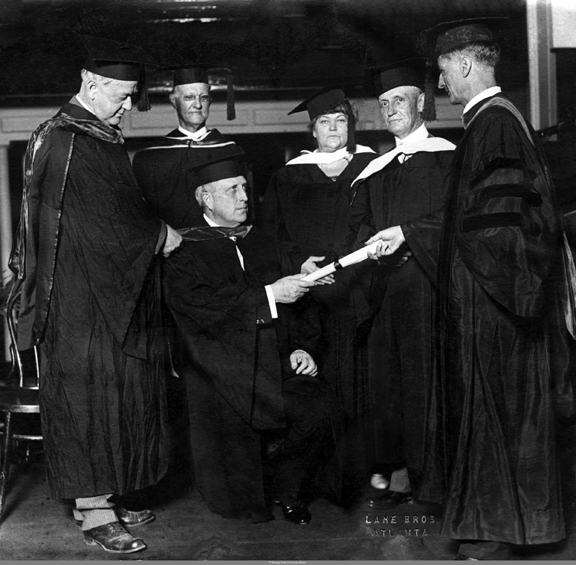
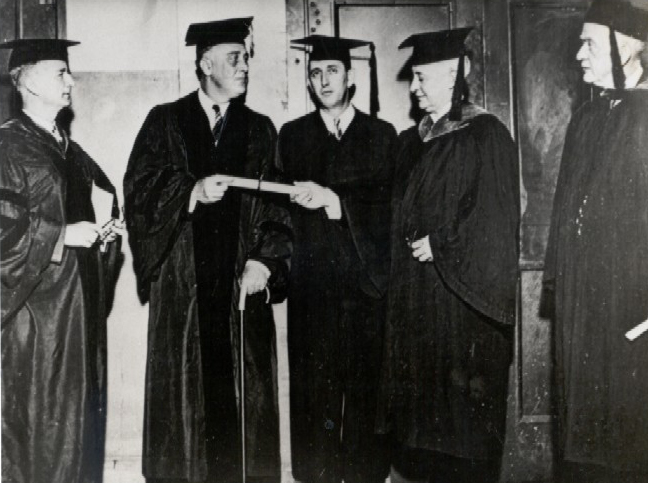
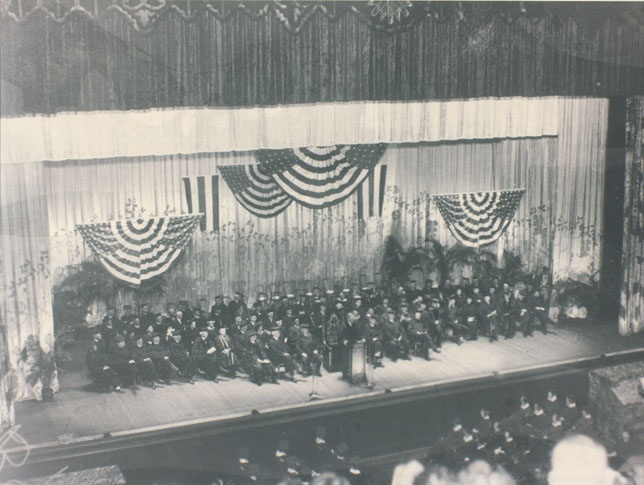
In the spring of 1932, the Fox was the host for the 1932 Ogelthrope University Graduation Ceremony (pictured above). It's honored guest was then candidate for president, Franklin Delano Roosevelt. In the photo above, Then Governor Roosevelt recieving an honoary degree from Oglethorpe University President, Thornwell Jacobs. In the second more casual picture, taken back stage, standing to the left of FDR is his son. Note in this photo, FDR is seen standing while using a cane. FDR made a point of usually not having any photos that gave a hint that he had suffered the ravages of Polio, so this makes this photo one of a rare few. While in Atlanta FDR also did some campaigning for his run for the White House.
By the end of Spring 1932, it was becoming very likely the Shriners were going to loose the Temple's Mosque. The final nail in the coffin was driven in by Loew's. Long before Loew's gained control of the Atlanta Fox Theatre, they had purchased the deGive Opera house in downtown Atlanta and had re-purposed it into the Loew's Grand Theatre. While it sat approximately 2,000 patrons, far less than what the Fox Theatre could accommodate, it was considered the Atlanta flagship of the Loew's Theater chain. Despite the Great Depression, Loew's decided it was going to build a new theater, relinquish the Fox lease, and sell the Grand. The Shriner's were given notice of Lowe's intentions of breaking the lease and the final show Under Loew's management occurred on June 25, 1932. As it worked out, Loew's plan to build a new "Grand" theater never materialized. Eventually Loew's chose to give the existing Grand a major Art Deco style renovation. The Grand soldiered on in this form until it was shuttered in the late 1970s.
In July 1932, the Trust Company of Georgia began legal proceedings against Yaarab Temple Building Company, and the Fox Theatres Corporation to begin to begin forclosure procedings on the Mosque property. In August of 1932, with no other option available to them, the Yaarab Temple filed for Chapter 7 bankruptcy liquidation.
Even though they were now in bankruptcy, the Yaarab Temple signs a one-year lease on the auditorium with a group of Atlanta business men led by Mr.N. Edward Beck called Southeastern Amusement Enterprises, Inc. Former Fox Orchestra leader Enrico Liede is selected as general manager for the theater.
Ownership of the Shrine Mosque/Fox Theatre complex was transferred to Trust Company Bank of Georgia in November. The next month, the Fox Theatre Complex was sold at public auction on the stpes of the Fulton County Courthouse to Theater Holding Company (THC). THC was an organization that represented bond holders that held now-worthless Shrine Mosque construction bonds that were issued by the Yaarab Temple to finance the construction of the Mosque. At the time of the Temple's bankruptcy, the bondholders were still owed $325,000. THC was able to purchase the building for $75,000 at the liquidation auction. This was done in the hope that the Fox Theatre Complex could be re-sold at a price that could recover some of the money that the Yaarab Temple defaulted on through their bankruptcy.
(Please Note: As long as the Yaraab Temple owned the building, I refer to it as the Atlanta Yaraab Temple (Shrine) Mosque with the Fox Theatre operating from inside it. Once the property was no longer owned by the Yaarab Temple, I then refer to the building as the Fox Theatre or the Fox Theatre Complex with a portion of the building used/rented by the Shriners as the "Yaraab Temple Mosque" portion of the complex.)
It appears that Southeastern Amusement Enterprises continued to operate the Fox Theatre without interruption during the bankruptcy and the Yaraab Temple also continued to operate within the Mosque portion of the complex. I believe this was in good part because the former bondholders that comprised Theater Holding Company were mainly composed of former or current Yaarab Temple members. After the bankruptcy was completed, the Yaarab Temple was allowed to remain in residence at the Fox Theatre Complex as renting tenants.The auditorium was then leased to Atlanta Enterprises, owned by Arthur M. Lucas and William K. Jenkins. At that time, both of these partners were members of the Yaarab Temple. Prior to this they had been in business as promoters of a community theater company. This was their first experience in operating a movie house, an auditorium of over 2000 seats, and a theater in a "downtown" district. Unlike Wilby, they are quite successful in running the theatre.
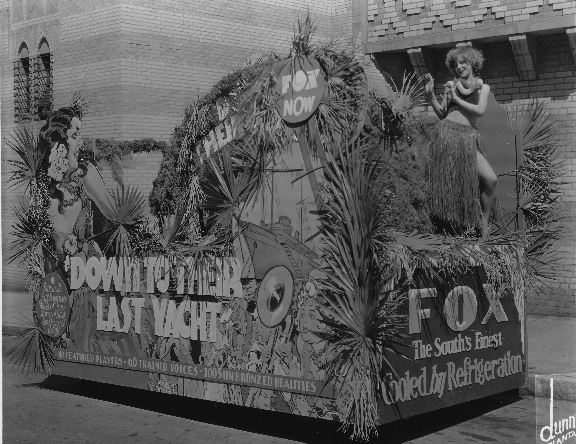
After two years of ownership and not being able to find a commercial buyer for the Fox Complex, THC acts on the notion that the Fox Complex should be sold to the City of Atlanta so it can be used as a Civic Auditorium for Fine Arts as well as to continue to show motion pictures. The idea was that the Fox would continue to be operated as it had been with Lucas and Jenkins leasing the auditorium and the Yaarab Temple continuing to rent the Mosque portion of the complex. Both tenants would directly report to the City's Public Buildings and Grounds Commitee.
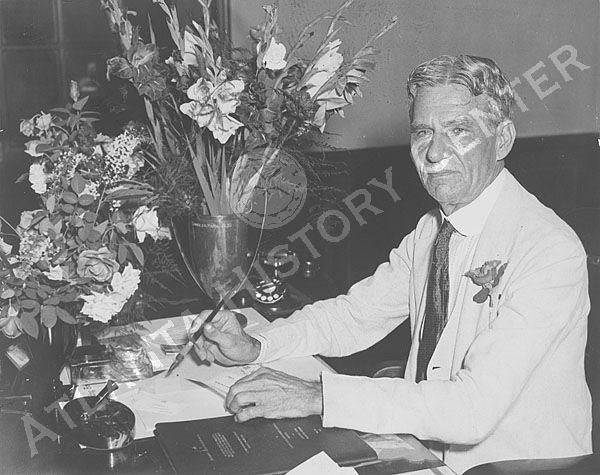 The
acquisition is controversial from the start, but Mayor James L.
Key
(pictured left) likes the idea and eventually the
City Council votes to approve the city's ownership of the Fox in April
of 1935. As
the measure worked its way through the City Council,
a fundraising
campaign was undertaken
to get companies and contributors to donate enough money to cover a
down payment. It's reported that the Coca-Cola company was the major
benefactor of the fundraising drive that raised $110,000.
The
acquisition is controversial from the start, but Mayor James L.
Key
(pictured left) likes the idea and eventually the
City Council votes to approve the city's ownership of the Fox in April
of 1935. As
the measure worked its way through the City Council,
a fundraising
campaign was undertaken
to get companies and contributors to donate enough money to cover a
down payment. It's reported that the Coca-Cola company was the major
benefactor of the fundraising drive that raised $110,000.
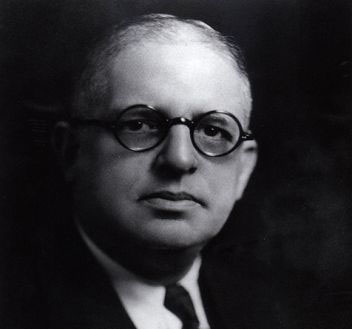 The
opponents of the sale brought up a legitimate problem. Theater
Holding Company had not paid its 1935 tax bill of approximately $9,000
and until that was settled, the City could not purchase the Fox
Complex. In order to get around this problem,attorneys Harold
U. Hirsch (pictured right) and Marion Smith on
behalf
of an unnamed citizens group file papers to incorporate "Mosque, Inc."
on March 21st. The mission of the new corporation, once the City voted
to accept the Fox Complex, was to purchase
the Fox complex from Theater Holding Company for $725,000.
Once
it was deeded to Mosque and the past due tax situation resolved, the
property could then legally be "given" to the
City. I am assuming that as part of the transaction to purchase the
building, part of the $110,000 down payment was used by Theater Holding
Company or Mosque, Inc. to settle the outstanding tax debt. To pay the
remaining $615,000 balance owed, the City would issue bonds that
would mature over a 21 year period and the cost of the bonds would be
covered by the expected proficts made from operating the Fox.
The
opponents of the sale brought up a legitimate problem. Theater
Holding Company had not paid its 1935 tax bill of approximately $9,000
and until that was settled, the City could not purchase the Fox
Complex. In order to get around this problem,attorneys Harold
U. Hirsch (pictured right) and Marion Smith on
behalf
of an unnamed citizens group file papers to incorporate "Mosque, Inc."
on March 21st. The mission of the new corporation, once the City voted
to accept the Fox Complex, was to purchase
the Fox complex from Theater Holding Company for $725,000.
Once
it was deeded to Mosque and the past due tax situation resolved, the
property could then legally be "given" to the
City. I am assuming that as part of the transaction to purchase the
building, part of the $110,000 down payment was used by Theater Holding
Company or Mosque, Inc. to settle the outstanding tax debt. To pay the
remaining $615,000 balance owed, the City would issue bonds that
would mature over a 21 year period and the cost of the bonds would be
covered by the expected proficts made from operating the Fox.
This concludes Part Two of our story. Please continue one to
read Part Three Midlife 1936-1969.